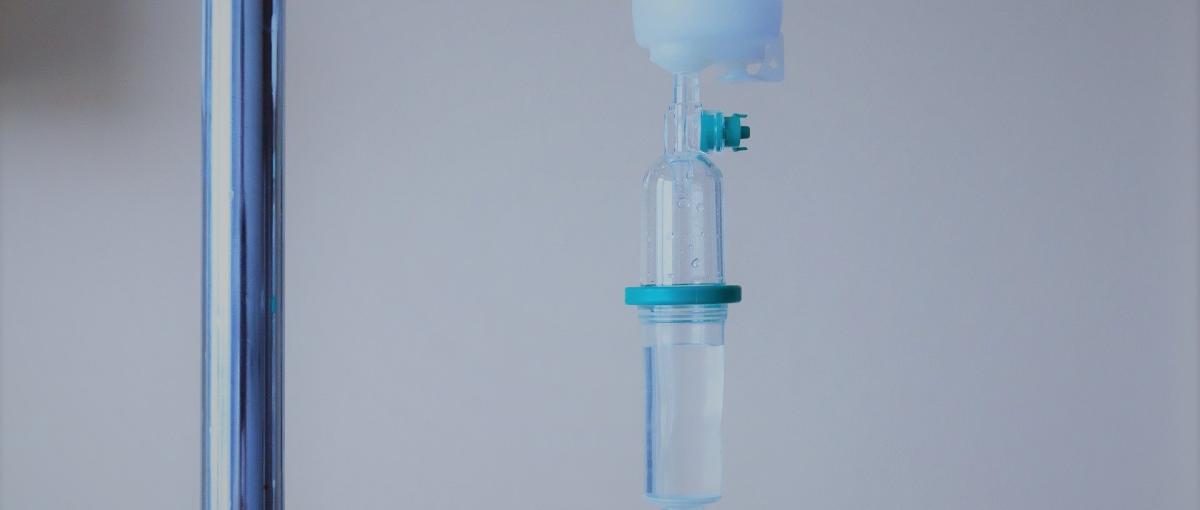Ketamine used to treat depression at the Misericordia and Grey Nuns hospitals

February 3, 2023
Thanks to intravenous ketamine infusions, Grace* found relief for severe depression that had plagued her for years after experiencing a trauma.
“I have more energy, and I can get out and do things,” says Grace. “It gives me a bit more independence because it’s very rare that I’ll go somewhere with crowds without my husband, but since the treatments, it really does take the edge off.”
Intravenous ketamine infusions are a research-backed therapy for treatment-resistant depression (TRD), a condition characterized by depressive symptoms that don’t improve even after the patient tries two or more antidepressants at an ample dose and duration.
The Misericordia and Grey Nuns Community Hospitals are a few of the first public hospitals in Canada to offer the treatment. Together, they have administered more than 10,000 infusions since 2015.
Before ketamine, Grace had tried almost everything. She went to therapy, trialed numerous antidepressants and used transcranial stimulation.
This ordeal is familiar to many people with TRD. And since antidepressants can take weeks or months to work, many people with TRD battle depression for many months or even years.
“The number of failed medications some of our patients have tried is often greater than 10,” says Dr. Carson Chrenek, a psychiatrist at the Misericordia Community Hospital. “They struggle with the disruption and length of time it takes for antidepressants to start working.”
Sarah*, another patient who had struggled with TRD for nearly 10 years before receiving ketamine infusions, says searching for an effective antidepressant often left her feeling frustrated.
“It’s hard when you’re switching an antidepressant,” she notes. “You have to titrate up with one and down with the other, so I struggled a lot with it, and it would take three or four months to know if the new medication was working for me or not. During a medication change, I feel really raw and out of control, and it’s hard to keep my outer mask in place for long.”
Ketamine infusions work differently from antidepressants and may offer relief sooner. “Ketamine acts in the brain to repair and regrow some of the pathways that are damaged when someone is severely depressed,” says Dr. Jennifer Swainson, also a psychiatrist at the Misericordia hospital. “It also has the potential to reduce suicidal thoughts very quickly.”
A typical course of intravenous ketamine includes eight sessions, with maintenance or booster treatments provided afterwards for some patients.
“The majority of people need a few treatments to see meaningful differences — three to five on average,” says Carson.
This was true for Sarah, who is now receiving infusions once every few weeks. “Within a day, I feel tired, but by the next day, I feel a real lift in energy, motivation and mood,” Sarah says. “I used to go twice weekly, then once a week and now every three weeks. Over time, we’re weaning me down to maintenance.”
Grace and Sarah say the mental health teams at the hospital have been integral to their healing and positive experience with ketamine infusions.
“The staff there are incredible,” Grace says. “They are so caring, empathetic and compassionate, and they make sure that you’re comfortable. They’re in the room while you’re having your treatment just to make you feel safe.”
What are the risks?
While ketamine can be life-changing for patients with TRD, Carson and Jennifer say there are risks just like with any medical treatment.
Patients may enter a dissociative state, where they feel detached from their bodies or perceive colours or sounds more intensely. But these effects only last during the time of the infusion, and staff monitor patients to make sure any uncomfortable effects are gone before patients go home.
Practitioners are also mindful that patients with addictive tendencies may try to find ketamine illegally, though there is little evidence to suggest that patients with depression who receive ketamine infusions will develop an addiction.
“We haven’t seen concern for ketamine abuse in a clinical setting, and we always assess the risk of substance abuse before treating patients,” Jennifer says. “But there is a possibility that people will look for it on their own, and it’s not safe to self-medicate with ketamine to treat your own depression.”
The birth of intravenous ketamine at Covenant Health
The Misericordia and Grey Nuns hospitals began using ketamine on a small-scale experimental basis in 2015. After extensive research confirmed its effectiveness and safety, Canadian psychiatric practice guidelines endorsed the drug for more widespread use in 2020.
Jennifer and Carson credit their teams at the Misericordia and Grey Nuns hospitals for ensuring the intravenous ketamine program’s success.
“The growth of the program was really dependent on collaboration from management, nurses and staff,” says Carson. “Once we started doing it and seeing benefits, there was enthusiasm to continue and advocate for increased access to treatments for patients at other sites in Alberta.”
*Grace and Sarah are pseudonyms we are using to protect our patients' privacy.